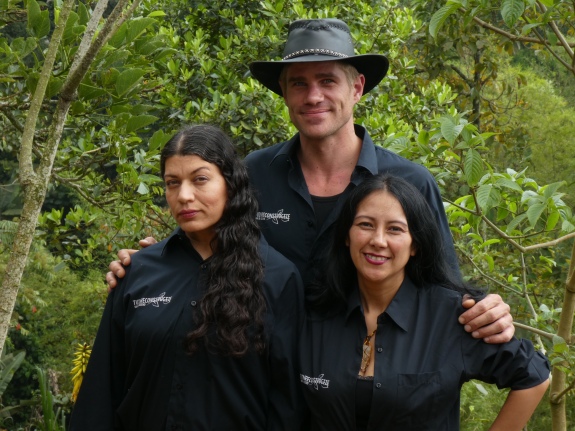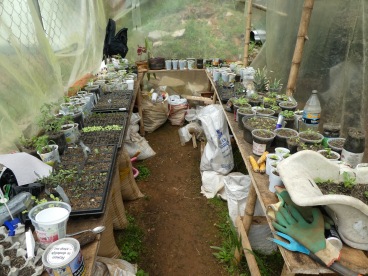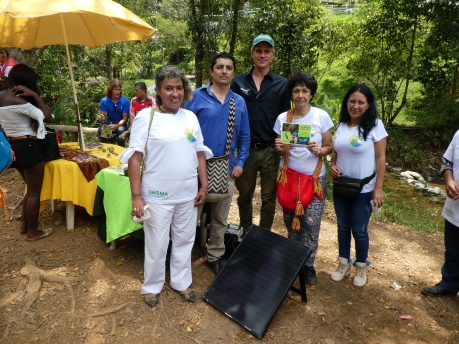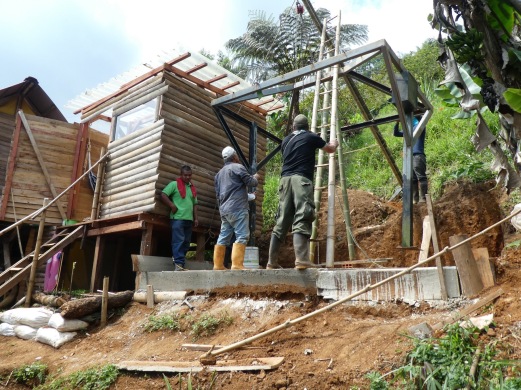Now and then, we all tend to forget about the importance of biodiversity, why it is essential for the preservation of every cultural and natural heritage, and for the protection of our unique ecosystems.
Put simply, biodiversity is the diversity of life on earth, it includes the variability among all living organisms, terrestrial, aquatic, and so on. Understanding how biodiversity works, the importance of every form of life on earth, from the wide range of plants to every animal species living in their natural environment, is essential for the improvement and conservation of human welfare. Such things as food security, improving nutrition, the air we breathe, the water we drink, all comes down to biodiversity.
And for Robert van de Griend, founder of the Biodiverse Development Foundation (BDF), conserving biodiversity is a priority.

Robert Van de Griend, founder of the BDF, accompanied by Martha (left) and Maricela (right), other members of the BDF
Establishing a foundation that is not only committed to the preservation of biodiversity but also seeking to leave a better impact on the environment is not only innovative but also showing the way towards a more sustainable development. It is to this that Robert Van de Griend and his Biodiverse Development Foundation have devoted themselves to.
But why is biodiversity so important you may ask? Because all species are connected. They depend on one another. Forests provide homes for animals. Animals eat plants. The plants need healthy soil to grow. Fungi help decompose organisms to fertilize the soil. Bees and other insects carry pollen from one plant to another, which enables the plants to reproduce. With less biodiversity, these connections weaken and sometimes break, harming all the species in the ecosystem. (National Geographic)
The more biodiversity, the stronger an ecosystem will be.
A 2017 study by the World Wildlife Fund (WWF) reported that scientists discovered 381 new species of wildlife in the Amazon. Sadly, many of them are already on the verge of extinction. And this is mainly due to rapid deforestation. And if deforestation is a particular concern it is because forests are home to much of the world’s biodiversity. (WWF)
I was fortunate enough to have the chance to interview Robert, a Dutch Environment Engineer (BSc), as he pursues a beautiful and sustainable challenge.
THE BIODIVERSE DEVELOPMENT FOUNDATION
The BDF is an environmentally friendly community, longing to protect earth’s biodiversity. There, nature plays a significant role, human interaction with its natural environment has been redefined.
One of the wooden cabin of the BDF, for visitors and volunteers
The foundation, which aims to conserve biodiversity, wants to encourage reforestation while seeking to stimulate local socio-economic development and benefit the local population. Located 30 minutes away from Cali city centre (Colombia), within Cali’s juridisction, the Foundation combines reforestation with productive agriculture, applying techniques from the Permaculture Science.
Robert, who comes from the Netherlands, one of the leading countries in terms of efficiency and sustainability regarding food production, water and wind management, spent most of his life travelling. After studying environmental science at the University of Breda and graduating at the University of Deventer, he went out to venture in the world, looking for eye-opening real life experience. He is the brain behind the whole concept.
“The objectives of this project were to generate an alternative source of income for locals while at the same time conserve the biodiversity and minimize the negative environmental impacts of tourism. A symbiosis between tourism and the conservation of biodiversity” says Robert.
“Going to Ghana in 2010 was an important initiator of eventually founding the foundation. The reason of my travels to this country was to carry out my final research for my study in Environmental Science. The objective of the research was to study the environmental impacts of tourism in a small authentic village.”

Robert and Czech volunteer Zdenek (back) carrying up bags with materials for food production and reforestation
The Biodiverse Development foundation was initiated in the spring of 2017. It consists of a self-sustainable farm, a community for volunteers and a visitors centre for everybody who is interested in contributing to the foundation’s objectives or would like to experience a sustainable way of living. Connected with nature, it offers a personal internal development.
The foundation takes full account of its current and future economic, social and environmental impacts, whilst addressing the needs of the travellers, the environment, and the local host community. It offers a kind of experience that respects their cultural heritage, conserves the biodiversity and minimises the negative environmental impacts that tourism can have.
Since the end of 2015, Robert is actively visiting Colombia. In 2016, he picked Cali as his main city with the focus of starting a project in the region. In December 2017, he meets Maricela and the whole project becomes more tangible. Maricela is from the mountains where she grew up and studied ecotourism for 12 years at the age of 30. In 2017, she and some other locals initiated the Mercado de la Montaña with whom the BDF also collaborates.
“Cali is located ideally in a geo-triangle with Medellin and Bogota and has an international airport. It doesn’t receive a lot of attention yet but deserves a lot of fame for its festivals, culture and wide spread Salsa. It is surrounded by beautiful nature: Parque Nacional Natural de los Farrallones (PNNF), Chocó (Pacific region). It belongs to a region where with a high need for socio-economic development and contains one of the highest concentrations of biodiversity in the world” explains Robert.

Robert with two flexible 50W solar panels use to help supply the foundation with electricity
Project of permaculture
Based on the concept of permaculture, the foundation is longing for a self-sufficient way of living. A kind of sustainable living where nothing is consumed other than what is produced by independent efforts, while working towards a constant surpluss of resources. By basing his foundation on the concept of permaculture, Robert longs to express the need for a culture that leaves the environment in a better state rather than depleting it.

Plant nursery where plastic is re-used for growing seeds

Volunteer seeding in nursery

Plantation of seeds close to living area
Permaculture is short for permanent agriculture. It comes from the consequences of conventional farming becoming an environmental concern, demanding alternative sustainable cultivation. The BDF is a sustainable response to this concern.
Conventional farming threatens our future by contributing to environmental degradation, menacing food production, and reducing biodiversity. Permaculture is designed as a set of principles, strategic ideas and ancient techniques that use biological resources and natural energies and pays attention to the ways nature adapts to it and responds. It longs to produce more food using fewer resources. It also uses resources that we have, to their fullest (like waste for example) to produce more and new resources.

Composing shed where kitchen rests and other organic material is composted

Dry composting toilet based on the concept of permaculture
Workshops for the rural community are being undertaken every now and then. For the BDF, supporting local communities is a priority. Robert stresses that the local community is entirely benefiting from the project.
“One of the first steps of the project was to establish a visitor centre that can host volunteers and visitors for activities related to the objectives of BDF. One of the other first steps was to integrate the BDF in the local community (corregimiento de Villa Carmelo) and another sub-community; the Mercado de la Montaña.” says Robert.

Market organised by the sub-community: the Mercado de la Montaña. Solar panels is one of the products that the BDF offers for a reduce price to the local community
Contributions from the Biodiverse Development Foundation come in forms of contributing to the exchange of social knowledge. Knowledge about sustainable farming, permaculture and renewable energy such as solar power is being exchanged. But it also comes in forms of support. The BDF supports the villagers with managing social capital, services, and monthly markets. Products and services from the BDF put in use for the community also include volunteer programs and outdoor experiences.
“The BDF also supports the local communities by buying services from community members. Locals are contracted for construction work and other services such as guidance, cooking and maintenance. Volunteers who participate in our volunteer programs can assist in daily work not only on the estate (finca) of Maricela (current visitors’centre) but also on other finca’s from other local landowners. Another way BDF supports the local communities is with their volunteers who organise workshops related to matter stimulating the socio-economic development of the community” continues Robert
Not only are the local community members welcoming the foundation, they are also eager to learn how to turn their own impact on the environment into a positive (with a surplus).

Robert and Maricela (right) with members of the local community
To support such an inspiring way of life, the foundation offers not only meals and accommodation, but eco tours, volunteer programs and spiritual retreats. They also accept donations, but the foundation likes to be independent in carrying out their ideology. Therefore they only accept donations on which there are no strings attached. All revenue created by the activities of BDF is used to pay salaries of locals, carry out maintenance, the purchase of necessary (construction) materials for volunteer programs, workshops etc. All board members of BDF work on a voluntary basis and do not receive salary, and all activities contribute directly to the objectives.
Throughout his foundation, Robert also aims to encourage a more sustainable tourism.
The travel and tourism industry is currently one of world’s fastest growing industries. For developing countries it is an important source of income. For popular tourist destination, a significant source of steady profit.
Colombia is a hot topic right now: tourism over there has just emerged. What was seen as a dangerous country is now being labelled as a top place to visit.
But with tourism comes benefits as well as problems. Tourism can have a bad impact in terms of environment, local communities, cultural identity, and social integrity. Sustainability, on the other hand is all about preserving our natural environment, meeting our needs in a way that doesn’t lead to negative impacts or compromise it for future generations, whilst driving innovation and supporting development without endangering our way of life.

2nd wooden cabin of the BDF for visitors and volunteers in construction with the help of the local community
Sustainable tourism, such as project like Robert’s, help appreciate the benefits of traveling while trying to make a better and more positive impact. Learning about the impact of tourism has led people to seek for more sustainable holidays, responsible retreats, where people are aware of the impact they leave.
“It is not necessary, and quite risky, to put labels such as ecotourism, rural tourism, community based tourism. What is important that it enhances a form of tourism that is productive rather than consuming” affirms Robert.
The BDF is a foundation of hope and change that takes you on a beautiful journey, marvelled in beautiful nature and willing to make a better impact on our natural environment.
And that’s what we need.
The loss of biodiversity has become a global challenge. For scientists: an environmental concern. With the loss of biodiversity, mankind loses the potential to adapt to current and future challenges, such as population growth and changes in climate. Threats to biodiversity lead to social inequality, deterioration of the environment, over-consumption of natural and ecological resources and the list goes on. It also menaces the integrity of our ecosystem, the survival of our own species.
Heliophélie (author)
SHARING IDEAS TO MAKE THIS WORLD A BETTER PLACE




